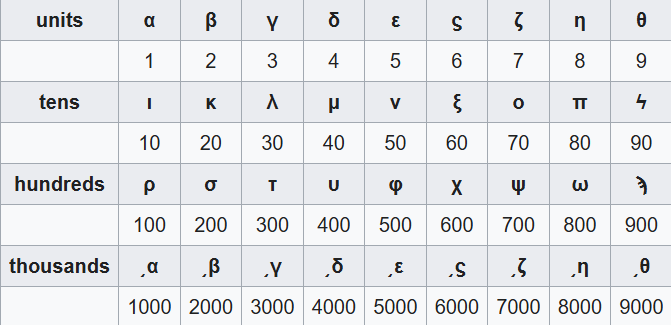The Etymology of Greek Numbers
Source: GreekReporter.com

Greek numbers, like most Greek words, have an etymology. They form the foundation of mathematics without which science would not exist. But what is the etymological background of Greek numbers?
Origins of the Greek numbering system
The Greek numbering system was originally developed in ancient Greece, where letters of the alphabet were used instead of numbers. The Arabic numerals (1, 2, 3…) that we use today had not yet been invented, and there was no system of decimal notation in columns of ones, tens, and so on. This was first developed by the Indians and later spread by the Arabs.
This alphabetic system first appeared on the Greek islands of the Aegean in the 6th century BC, likely introduced by the Egyptians through trade.
Influence on mathematics and prominent figures
At the same time, Pythagoras developed his famous theorem, while a few islands away in Samos, the Greeks had already discovered the alphabetic numbering system. Although there is no clear evidence that Pythagoras used these numbers, this discovery contributed to a revival of their popularity some 150 years later.
Moreover, by the late 4th century BC, alphabetic numbers returned to prominence. Additionally, this period coincided with important mathematical advancements, such as Archimedes‘ applied mathematics and Ptolemy’s calculations of latitude.
The Greek numbers from 0 to 10 are written and pronounced as:
0 – midén
1 – éna
2 – dío
3 – tría
4 – tésera
5 – pénde
6 – éxi
7 – eptá
8 – októ
9 – enéa
10– déka
Etymology of Greek numbers
The etymology of these numbers has ancient roots. In Ancient Greek, “one” had three genders: is for masculine, mia for feminine, and en for neuter, which influenced the modern form. The root en is evident in the declension, such as enos in the genitive or enan in the accusative.
The number dío comes from deo, meaning “to divide,” and daizo, meaning “to cut in two,” while tría is derived from tarasso (to stir).
The number tésera originates from the word deuteros (second) with reduplication, leading to dedefteros and then tetetfera, meaning “twice two.”
Moreover, ancient Greeks called the number pénde “pempai.” In Homer, pembazomai referred to a number based on the five fingers.
The number éxi was ex in ancient times, linked to a quinary (base-five) counting system, representing “one plus five.” Over time, en plus pas (one and five) evolved to epas, ecas, and finally exas, as the use of “a” vowel stopped.
Meanwhile, the number eptá comes from septos, as 7 was sacred in antiquity. At the same time, októ was related to kotili, meaning “cups,” as each of an octopus’s eight legs has multiple cups (kotiles), making it kotilotos, then kototos, and finally oktotos (eight).
The number enéa was based on the verb enneo (to triple). Ennitos and einatos were used to denote 9 as a sacred number, being thrice three.
The number déka derives from dechomai (to receive), where didekto meant “to extend hands with all ten fingers.”
The original article: belongs to GreekReporter.com .
